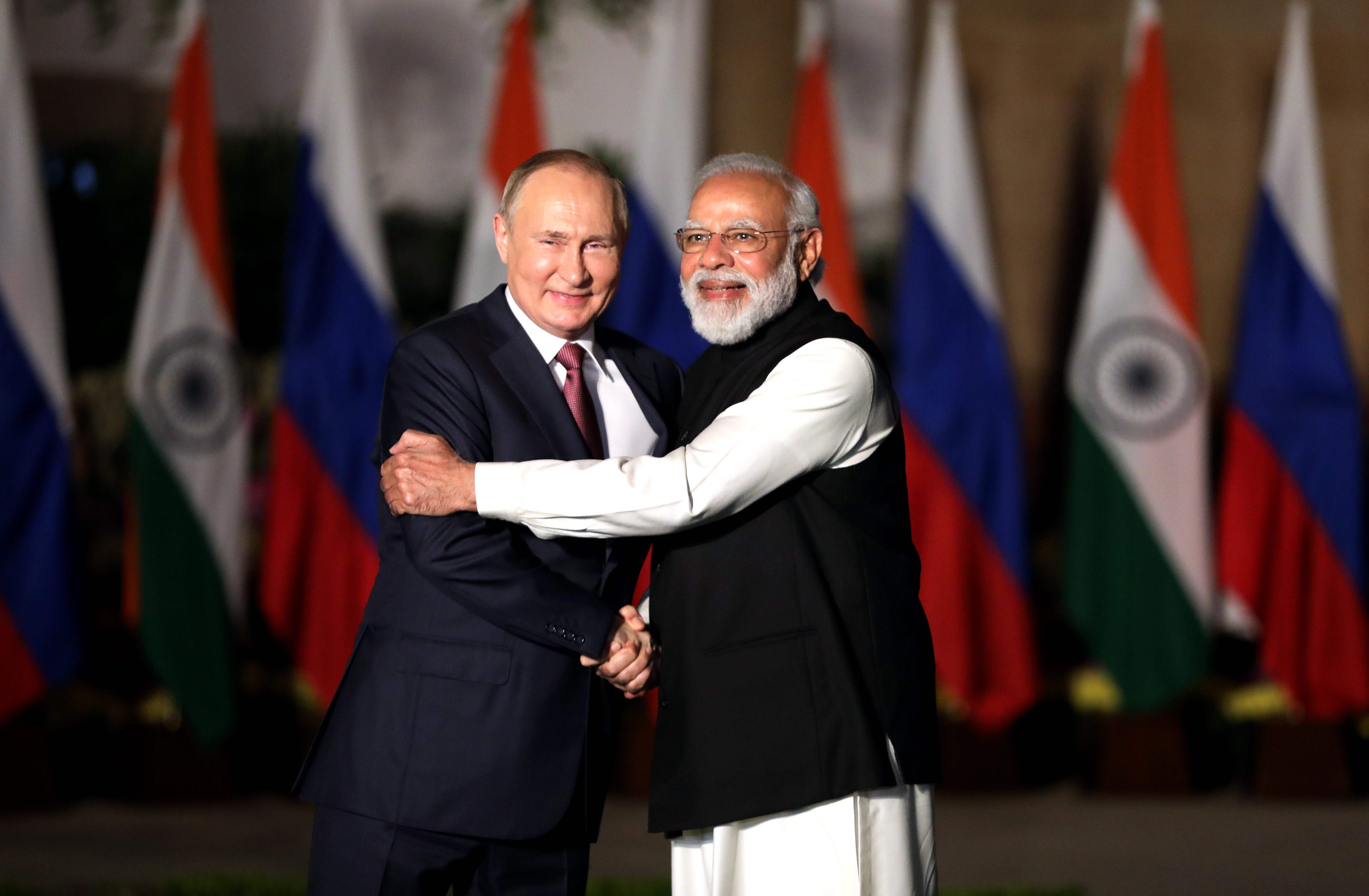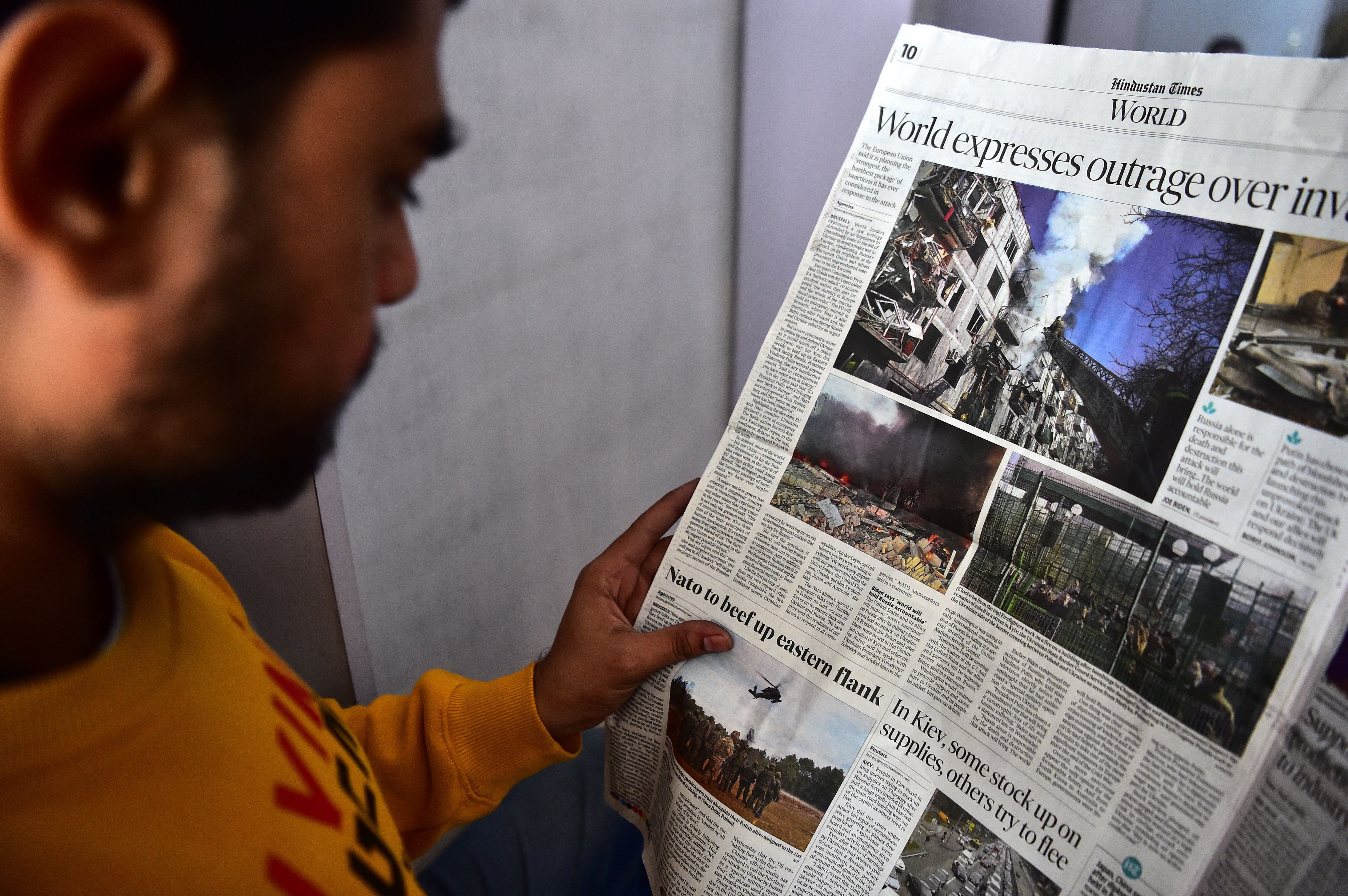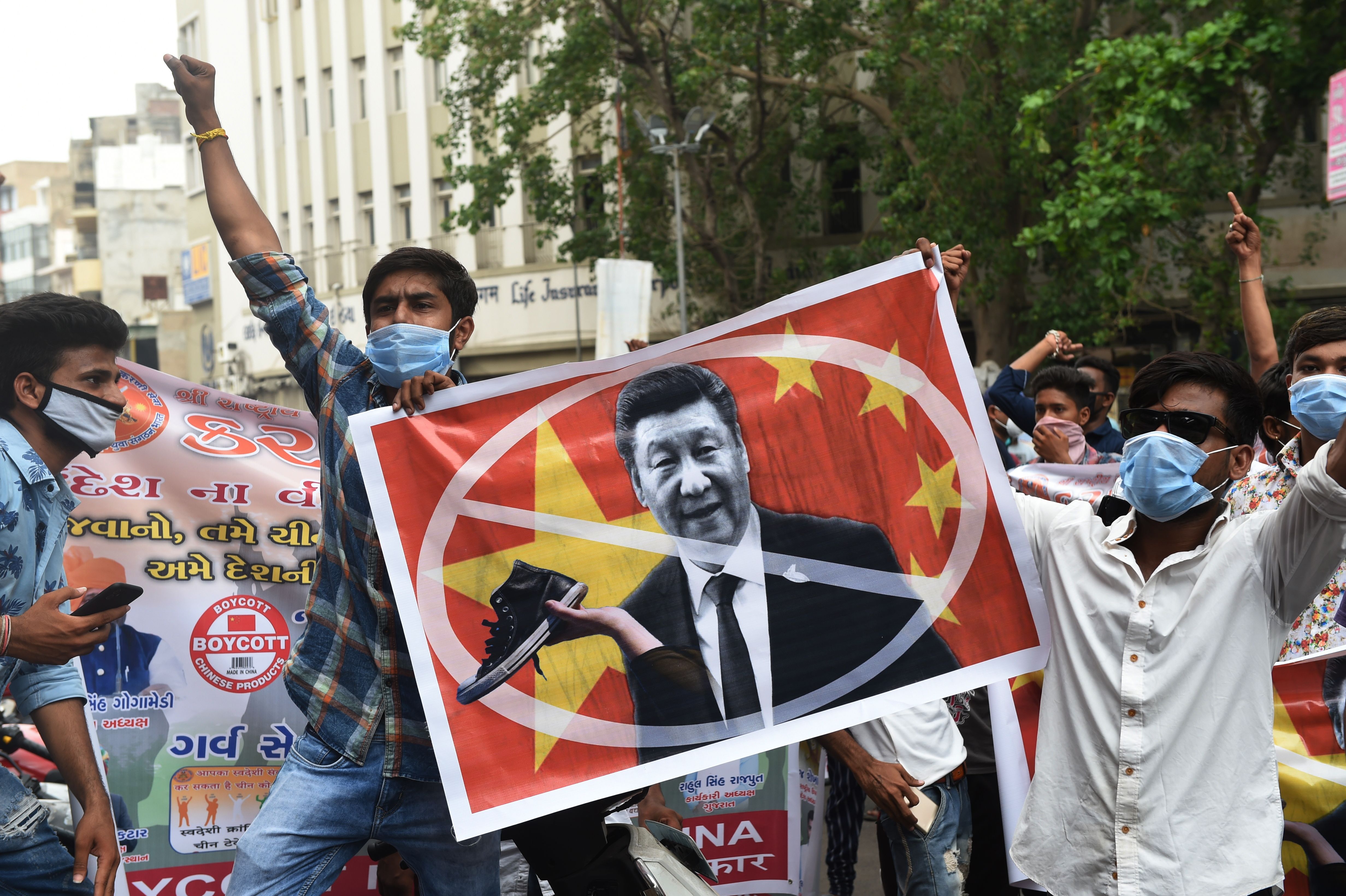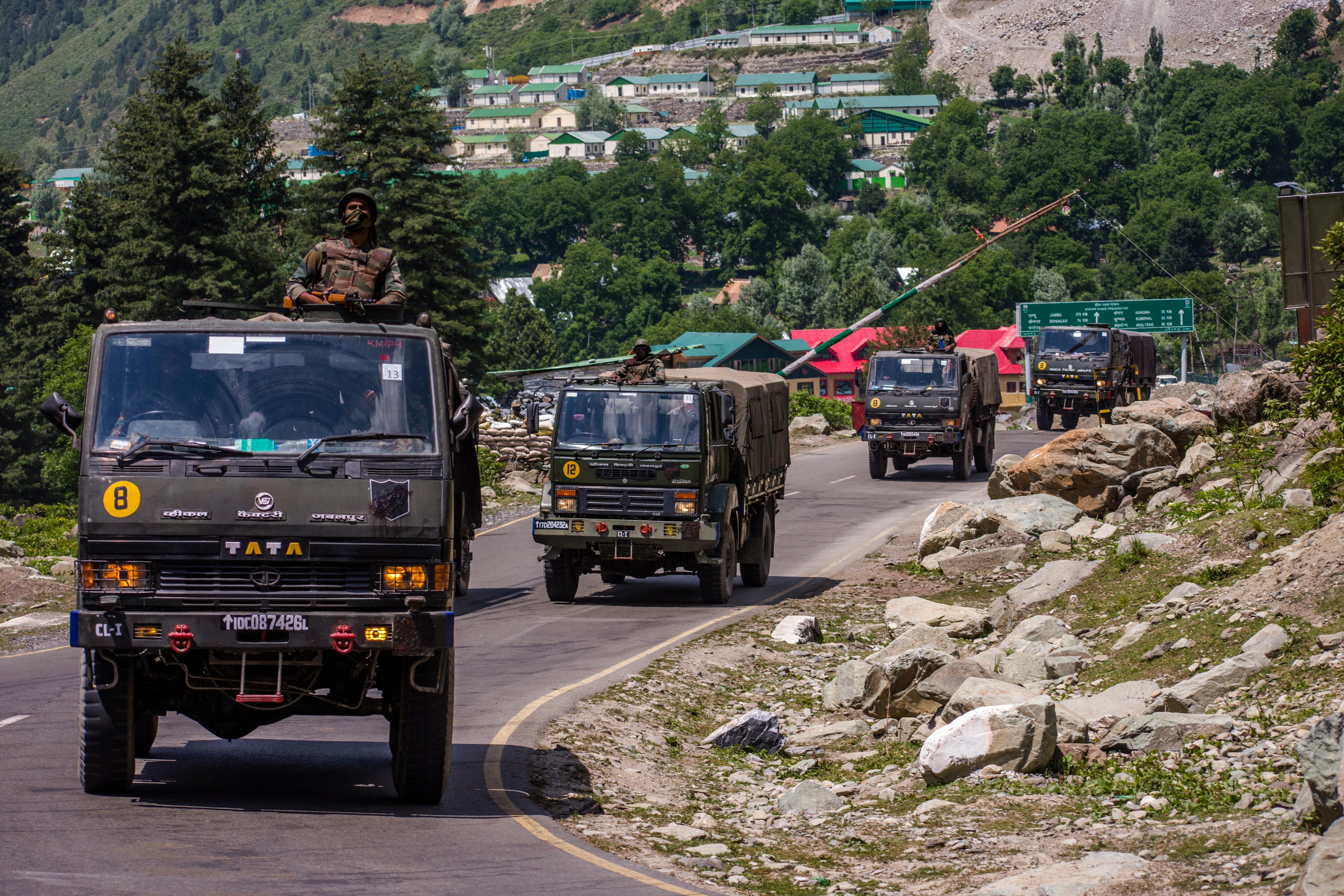Ukraine crisis poses dilemma for India as it walks a tightrope between Russia and the west
India has stayed largely silent on Russia’s invasion of Ukraine, as it tries to remain neutral between Moscow and the west amid fears that its arch-rival China could take advantage of the conflict, reports Shweta Sharma


For a country wishing to emerge as a leader on the global stage, India has remained notably quiet as world powers have condemned Russia over its invasion of Ukraine, vowed strong action, and imposed wide-ranging sanctions by way of response.
Following Thursday’s assault by land, sea and air, Indian prime minister Narendra Modi spoke to Vladimir Putin and urged “an immediate cessation of violence”, but stopped short of criticising Russia or its leader.
A statement by the Kremlin after the call said that “the prime minister of India was appreciative of the explanation” in respect of Russia’s concerns over what it considered to be violations of the Minsk agreement, and that Mr Modi had discussed the safety of 18,000 Indian students in Kyiv.
“[Mr Modi] reiterated his long-standing conviction that the differences between Russia and the Nato group can only be resolved through honest and sincere dialogue,” a statement by India’s foreign ministry said.
At a UN Security Council (UNSC) meeting on Friday, a resolution demanding that Moscow immediately stop its aggression towards Ukraine and withdraw all troops was approved by 11 members, and was blocked by Russia, while three countries abstained: China, the United Arab Emirates (UAE), and India.
With Russia, a “time-tested” and “reliable” ally, on one side, and trading partners the US, UK, and European Union on the other, India has been striving to remain on the fence as the rift grows ever wider between Moscow and the west.
Old policy habits die hard in India, and, as the country continues its balancing act of building ties with global powers while refusing to join alliances, it is unlikely that it will change course on Russia, despite the worsening conflict and the growing condemnation of Moscow by countries around the world, analysts said.
Given that key partners are roundly condemning Russia, India’s silence will become louder
India’s neutral stance has been largely supported at home, and subject to limited scrutiny on a global level, yet that might change the longer New Delhi stays silent on the issue.
“Given the scale of what Putin has done, and given that key partners in Washington, Europe and Asia, as well as many developing world capitals, are roundly condemning Russia, India’s silence will become louder,” said Michael Kugelman, deputy director and senior associate for south Asia at the Wilson Centre, a think tank.
Pressure has been mounting on India, as the US expects support from its allies to isolate Russia internationally and go on a diplomatic offensive against Moscow.

On Friday, US secretary of state Antony Blinken spoke by phone to India’s external affairs minister S Jaishankar and stressed the need for a “strong collective response”.
Mr Kugelman said India could send a very powerful message to the Indo-Pacific region – and to Russia – by standing up to Moscow, but that such a step would be unlikely.
“For a close, long-standing partner of Russia to issue a public condemnation for the first time – that would go a long way toward telegraphing to Moscow just how wrong its moves have been. I don’t see India doing this, and even if it does, I don’t see that giving Putin pause,” he told The Independent.
The Ukraine-Russia crisis has also seen India isolated in the Quadrilateral Security Dialogue, known as the Quad, of which it is a member along with the US, Australia and Japan.
India has unique relations with the west and Russia and they’re both important strategic partners
At a conference on 11 February, Mr Jaishankar remained silent and resisted calls by the other three nations to condemn Russia’s “aggression” towards Ukraine, as warnings of an imminent invasion grew louder and more persistent.
Yet the divisions in the Quad are just the tip of the iceberg for Mr Modi’s government, as experts say the conflict has opened a Pandora’s box of more complex questions over how China – with whom New Delhi’s relationship is becoming increasingly hostile – might benefit, and how India might find itself in an uneasy grey area between Russia and the west.
“India has unique relations with the west and Russia and they’re both important strategic partners,” said Harsh V Pant, director of research at the Observer Research Foundation – a think tank – and a professor of international relations at King’s College London.
“The way contemporary geopolitics is evolving, it is putting India and Russia on different strategic trajectories that will have an impact on [their] relations,” he added. “And it will have an impact on how far India continues to balance its engagement with Russia and with the west.”
Over the last two decades, the value of India’s defence trade with Russia has increased dramatically, from £146m in 2000 to £14bn in 2020. Similarly, India’s arms trading with the US was worth more than £15.5bn in 2020, compared with near zero in 2008.
India’s cooperation with Russia is only set to grow, after Mr Putin signed 28 agreements during a visit New Delhi to meet his counterpart in December 2021.
Henry Wilkinson, chief intelligence officer at Dragonfly, a geopolitical and security intelligence service, said India’s neutrality “served a purpose”, but that its reliance on bilateral ties over wider alliances may not prove so effective in the future.

“Given its dependence on Russia in defence, it probably isn’t a problem, but in a global order where interstate conflict is becoming more likely and the rules-based international system is eroding, alliances matter,” he said.
“Ukraine may prove a good example of why the protection alliances give will matter more, not less, in the future.”
India will also be increasingly concerned about the way in which the Ukraine crisis will influence Russia’s relationship with China.
At the start of February, as Russia steadily increased its military presence on the Ukrainian border, Mr Putin flew to Beijing for the opening of the Winter Olympics and a meeting with Chinese president Xi Jinping.
In a joint statement issued by the Kremlin, the two leaders proclaimed that their strategic and diplomatic partnership had “no limits”.
China and Russia’s deepening ties are considered a real threat to India, and the country’s former ambassador to Kazakhstan, Sweden and Latvia, Ashok Sajjanhar, said he thought Beijing was emerging as one of the sole beneficiaries of the nascent conflict.
“The tensions are pushing Russia closer to China, it is reducing its options, and Moscow is becoming more dependent on Beijing,” he told The Independent.
At the same time, observers are worried that Russia’s belligerence has shifted the world’s focus, and even resources, away from China, which Mr Sajjanhar described as the “major, global adversary to global peace, security and stability” – referencing its “muscle-flexing” against Taiwan, Hong Kong and India.
India may wish to remain neutral ... but this may not be an option
India’s former ambassador to Russia, PP Shukla, said: “Deliberately, or by inadvertence, the west is taking its eye off the ball in the Indo-Pacific, and that is the greater danger.”
While India has previously remained neutral on the issue of Russia – namely in 2014, when it abstained from a UNSC resolution condemning Moscow for invading Crimea – this time the stakes are higher, analysts say, due to the tense situation along its disputed Himalayan border with China.
India and China have been engaged in a tense standoff since a deadly battle in June 2020, with several failed talks over the 3,500km-long border and concerns in New Delhi that Beijing is settling whole new stretches of the region.
“I’d suggest that India’s leaders should think carefully how they’d like the world to react if China seizes territory that is internationally recognised as Indian,” said James M Acton, co‑director of the nuclear policy program at Carnegie Endowment for International Peace, a think tank.
Manoj Kewalramani, chair of the Indo-Pacific studies programme at the Takshashila Institution, a research centre, echoed this point.
“The key thing is, do we [India] want to see certain rules of international relations being violated? Rules such as the territorial integrity of countries, [or their] sovereignty? And what does that do as a precedent for other powers?” asked Mr Kewalramani.

However, Mr Jaishanka, India’s foreign minister, has denied that his country exhibited double standards by abstaining on the UNSC vote while criticising China over the border dispute.
At the recent Munich Security Conference, he said issues in the Indo-Pacific and transatlantic regions were “quite distinct challenges”, and that they should be seen as such by the world.
“In fact, if there was a connection, by that logic, you would have had a lot of European powers very early taking very sharp positions in the Indo-Pacific, and we didn’t see that. We haven’t seen that since 2009,” Mr Jaishankar told the conference.
This comes at a time when India has started to receive its supply of S-400 weapons, Russia’s most advanced long-range surface-to-air missile defence system, having signed a £3.6bn deal in 2018 despite warnings from the Donald Trump administration that doing so could invite US sanctions.
New Delhi is still waiting to get a waiver under the Countering America’s Adversaries Through Sanctions Act, which saw sanctions being imposed on Turkey in 2020 over an S-400 deal with Moscow.
Jonah Blank, a senior political scientist at the RAND Corporation, a think tank, said India’s balancing act would not be sustainable if the US and Europe imposed secondary sanctions on Russia as a result of the Ukraine conflict.
“There’s a real chance that Putin’s invasion will establish a deep rift between the democratic nations and autocratic ones,” he told The Independent.
“China has already signalled that it will support Putin – at least in the short term. India may wish to remain neutral, but if the US and Europe impose secondary sanctions, this may not be an option.”



Join our commenting forum
Join thought-provoking conversations, follow other Independent readers and see their replies
Comments